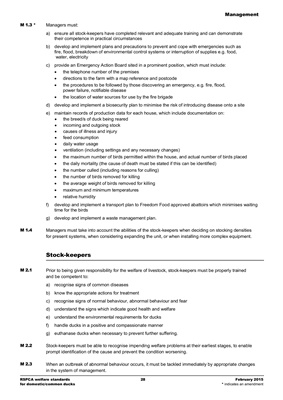
Management
RSPCA welfare standards
for domestic/common ducks
28 February 2015
* indicates an amendment
M 1.3 *
Managers must:
a) ensure all stock-keepers have completed relevant and adequate training and can demonstrate
their competence in practical circumstances
b) develop and implement plans and precautions to prevent and cope with emergencies such as
fire, flood, breakdown of environmental control systems or interruption of supplies e.g. food,
water, electricity
c) provide an Emergency Action Board sited in a prominent position, which must include:
the telephone number of the premises
directions to the farm with a map reference and postcode
the procedures to be followed by those discovering an emergency, e.g. fire, flood,
power failure, notifiable disease
the location of water sources for use by the fire brigade
d) develop and implement a biosecurity plan to minimise the risk of introducing disease onto a site
e) maintain records of production data for each house, which include documentation on:
the breed/s of duck being reared
incoming and outgoing stock
causes of illness and injury
feed consumption
daily water usage
ventilation (including settings and any necessary changes)
the maximum number of birds permitted within the house, and actual number of birds placed
the daily mortality (the cause of death must be stated if this can be identified)
the number culled (including reasons for culling)
the number of birds removed for killing
the average weight of birds removed for killing
maximum and minimum temperatures
relative humidity
f) develop and implement a transport plan to Freedom Food approved abattoirs which minimises waiting
time for the birds
g) develop and implement a waste management plan.
M 1.4 Managers must take into account the abilities of the stock-keepers when deciding on stocking densities
for present systems, when considering expanding the unit, or when installing more complex equipment.
Stock-keepers
M 2.1 Prior to being given responsibility for the welfare of livestock, stock-keepers must be properly trained
and be competent to:
a) recognise signs of common diseases
b) know the appropriate actions for treatment
c) recognise signs of normal behaviour, abnormal behaviour and fear
d) understand the signs which indicate good health and welfare
e) understand the environmental requirements for ducks
f) handle ducks in a positive and compassionate manner
g) euthanase ducks when necessary to prevent further suffering.
M 2.2 Stock-keepers must be able to recognise impending welfare problems at their earliest stages, to enable
prompt identification of the cause and prevent the condition worsening.
M 2.3 When an outbreak of abnormal behaviour occurs, it must be tackled immediately by appropriate changes
in the system of management.